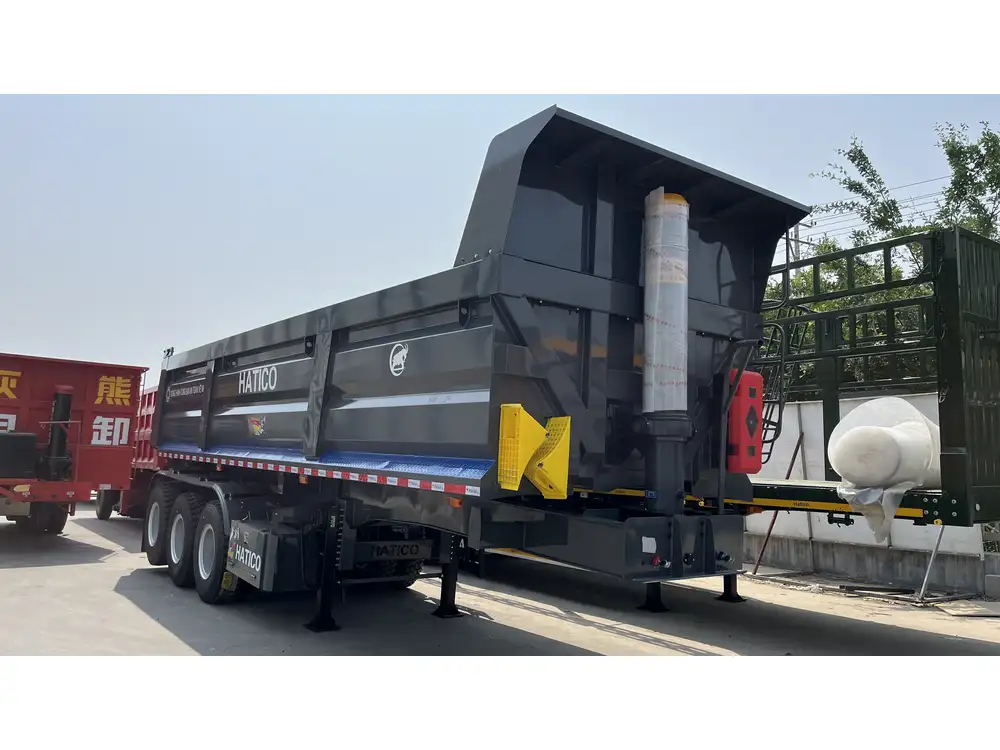When it comes to the transportation and logistics industry, both dump trucks and tractor trailers serve pivotal roles. However, if you’re contemplating which of these vehicles generates more revenue for their operators, it’s crucial to dissect the intricacies of their operational capacities, financial implications, and various variables affecting profitability. We aim to provide a comprehensive understanding of these two factions in the heavy-duty vehicle domain.
Understanding the Basics: Definitions and Functions
What is a Dump Truck?
A dump truck, often referred to as a tipper truck, is designed primarily for the transportation of loose materials. It typically consists of a spacious bed that can be raised at the front to deposit its load directly onto the ground. Common materials transported include:
- Sand
- Gravel
- Dirt
- Demolition debris

What is a Tractor Trailer?
A tractor trailer, also known as an articulated lorry, combines a tractor unit (which provides the power) and one or more trailers (which carry the load). This configuration allows for versatile transport of varied cargo, such as:
- Consumer goods
- Freight
- Heavy machinery
- Bulk liquids
Financial Overview: Comparing Revenue Streams
Initial Investment and Operating Costs
The financial aspects of owning and operating dump trucks and tractor trailers differ significantly. Here’s a breakdown:
| Category | Dump Truck | Tractor Trailer |
|---|---|---|
| Purchase Price | $30,000 – $200,000 | $50,000 – $150,000 |
| Operating Costs | Fuel: $3.50/gallon | Fuel: $3.50/gallon |
| Maintenance: $1,000/year | Maintenance: $1,500/year | |
| Insurance: $2,500/year | Insurance: $4,000/year | |
| Revenue Potential | $50,000 – $100,000 per year | $80,000 – $200,000 per year |

Revenue Generation Factors
Type of Work:
- Dump trucks are ideal for construction sites, often responsible for delivering materials. Their income potential might be hindered by seasonal jobs and local regulations.
- Tractor trailers benefit from a broader scope of work, ranging from regional to national freight delivery. This diversity enables a steadier revenue generation potential.
Hourly Rates:
- The average hourly rate for a dump truck operator falls between $30 – $55.
- Conversely, tractor trailer drivers typically earn between $45 – $75 per hour, reflecting the complexities of long-haul driving and the significant responsibilities involved.
Utilization Rates:
- Dump trucks may operate for fewer hours due to the nature of construction projects, often leading to downtime between loads.
- Tractor trailers often see higher utilization rates, with drivers frequently logging longer hours on the road, maximizing their revenue potential.
Seasonal Variations in Income
It’s imperative to acknowledge the seasonal fluctuations that impact each vehicle’s earnings.
- Dump Trucks: Demand often surges during spring and summer, coinciding with construction peak seasons. However, winter can herald a sharp decline in work.
- Tractor Trailers: Demand for transportation remains relatively stable year-round, although certain products might see seasonal spikes (e.g., holiday goods).
Choosing the Right Vehicle Type

Market Demand and Location
Understanding market demand is essential for making an informed choice between a dump truck and a tractor trailer.
- Urban Areas: Construction activities in city environments might favor dump trucks, as many projects require managing local materials efficiently.
- Rural and Suburban: Areas with substantial travel routes will benefit from tractor trailers, especially if regional distribution and logistics are prioritized.
Longevity and Resale Value
Longevity matters concerning initial investment recovery.
| Category | Dump Truck | Tractor Trailer |
|---|---|---|
| Average Lifespan | 10 – 15 years | 10 – 20 years |
| Resale Value | 40% – 60% of original price | 50% – 70% of original price |
In most instances, tractor trailers tend to retain their resale value better than dump trucks, as they are applicable in a widening scope of industries beyond just construction.
Additional Considerations Impacting Revenue

Licensing and Compliance Costs
Different vehicles incur varying compliance-related expenses. Trucker operators may require additional certifications and licenses, such as:
- Commercial Driver’s License (CDL)
- Endorsements for specialized hauls
This can have an long-term financial impact on prospective operators.
Insurance Dimensions
Insurance costs can escalate based on several factors, including:
- Vehicle type
- Cargo value
- Radius of operation
On average, dump trucks can expect lower insurance costs because they are often employed in a limited scope of work compared to the far-reaching risks associated with long-haul trucking.
Depreciation and Maintenance
Assets depreciate at different rates, impacting overall lifecycle costing.
- Dump Trucks: Regular wear and tear can necessitate more frequent repairs, thus, increasing overall expenses.
- Tractor Trailers: Resilient against typical usage wear, but require rigorous maintenance checks that can be costly over time.

Conclusion: Key Takeaways
In evaluating who makes more—dump trucks or tractor trailers—it’s apparent that multiple factors converge. Tractor trailers generally prevail in terms of higher revenue generation potential due to their operational versatility, broader market demands, and consistent income flow from freight hauling. While dump trucks hold significant value in construction markets, their profitability is subjected to seasonal trends, geographic constraints, and project-based work.
Ultimately, the choice between a dump truck and a tractor trailer hinges upon individual business goals, regional opportunities, and personal circumstances. Operators must thoroughly assess their targeted industries, operational scopes, and financial projections before committing to one vehicle type.
Next Steps
- Conduct Market Research: Investigate your local landscape for opportunities specific to either dump trucks or tractor trailers.
- Financial Analysis: Create detailed projections that consider all costs and revenue possibilities based on the chosen vehicle type.
- License and Compliance Check: Understand all requirements pertinent to your selected vehicle to ensure smooth operational initiation.
Final Thought
As we navigate the intricacies of heavy-duty vehicles, it is imperative to remain aware of how market dynamics, financial metrics, and operational demands come into play. This understanding equips us with the knowledge necessary to pave a successful transportation venture, whether through the powerful weight of a dump truck or the expansive reach of a tractor trailer.



